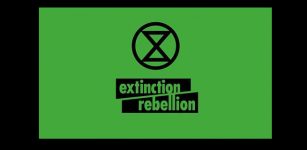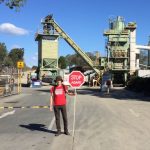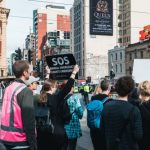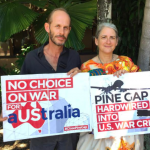Civil Disobedience Required: An Interview With Extinction Rebellion’s Miriam Robinson

Hundreds of police officers from other forces were called in last week to back up London’s Metropolitan police, as it tried to clear climate change protests from parts of the city that had successfully brought those areas to a standstill.
The Extinction Rebellion protests began blocking major thoroughfares throughout London on 15 April. And despite key areas being dispersed over the weekend, many of the protesters continued on into a second week. And over 1,000 of them were willing to be arrested for the cause.
“It’s been a really challenging operation. They’re using very dynamic communications. And very dynamic tactics,” Metropolitan police commissioner Cressida Dick told the BBC. “We haven’t seen anything like this in this city or around the country before”.
And the message of the recently-established protest movement that managed to bring areas of London to a grinding halt is politicians and governments are not doing anything about the ecological crisis that’s gripping the world, so it’s time the public took matters into its own hands.
The power of protest
The Extinction Rebellion Australia website asserts that the Earth is right now facing mass species extinction and societal collapse. Although, it’s still possible to avert the worst of it by bringing about an end to ecological and social injustices.
Given this set of circumstances, the movement suggests that citizens have a “moral duty to rebel” in order to save the planet for future generations. And it points to past nonviolent civil disobedience movements as proof that this method of demonstrating is the most effective.
As the mobilising in London – as well as in 80 other cities around the world – was about to get underway, renowned environmental and political activist George Monbiot wrote, “Only rebellion will prevent an ecological apocalypse”.
Monbiot further put forth that the political class has shown itself to be “strategically incapable of addressing even short-term crises, let alone a vast existential predicament”, however the idea that simply voting in elections “is the only political action required to change a system” still prevails.
On home soil
Meanwhile, in Canberra, current prime minister Scott Morrison appeared in parliament with a lump of coal in his hand back in February 2017, spruiking the burning of the sedimentary rock, as being “an important part of our sustainable… energy future”.
Indeed, environment minister Melissa Price recently signed off on the final federal government hurdle preventing the Adani coal mine going ahead without CSIRO approval, while the PM cracked the whip at vegan protesters drawing attention to the ecological devastation of animal agriculture.
Sydney Criminal Lawyers spoke to Extinction Rebellion Australia spokesperson Miriam Robinson about time running out on the ecological clock, the significance of the events that transpired in London and how the movement is mobilising in this country.
Firstly, last week, members of Extinction Rebellion occupied parts of London for days on end. Local police were unable to adequately shut down the peaceful protests. Miriam, how significant would you say these events were?
Very significant. It’s just the beginning of a global movement. And certainly, it has encouraged a lot of other people all over the world.
I was watching the global Extinction Rebellion media stream, and people around the world were doing things for the first time. And it was partly because of inspiration over what was going on in London.
The police being overwhelmed by the numbers of people on the street was a good thing. The police need to realise that citizens are going to have to do these things in self-defence.
I’d actually like to see the police join us, and be on our side, rather than being instruments to crack down on people trying to save everyone’s lives.
In which other countries has the Extinction Rebellion been mobilising?
They did a tally recently and there were about 36 countries. Some of those that have just joined, include Ghana and India. It’s happening all over Europe, in South American countries and Mexico. Basically, everywhere.
And how long has the movement been active?
London started it. They had their first actions in November last year. But, they had been planning and building up the movement for about six months before that. So, getting on close to a year now.
They’ve got to the point of having thousands of people on the streets. That didn’t just happen overnight. It took a lot of planning and organising to get that many people.
In Melbourne, we started up in November, as we saw it all happening in the UK. So, we started organising here about 5 months ago.
The Extinction Rebellion is a response to the ecological crisis taking place on Earth. How would you describe this situation? And how desperate is it?
It’s absolutely desperate. People don’t realise quite how bad it is. Having 12 years left is the figure that’s being bandied about. It’s wrong. We’ve got closer to 3 or 4 years.
Emissions have to start going down drastically. And we have start drawing down carbon by repairing forests and doing everything we can possibly think of in the next few years.
If we let this situation go on for another 12 years, it’s game over. In fact, we don’t even know. We may have already passed tipping point. So, we’re just having to hope against hope that we haven’t yet.
It’s that drastic. It’s the end of human civilisation, and possibly the extinction of 90 percent of life on Earth.
We’re heading for 6 degrees of warming or more by the end of the century. We’re heading for 3 or 4 degrees of warming by 2050. People don’t realise how bad things actually are.
There have been a number of vegan documentaries produced over recent years that warn that the animal agricultural industry is a prime cause of environmental devastation, whereas people are primarily focused on fossil fuels. Can you speak on that?
Fossil fuels are about a third of the problem. One of the reasons that it’s focused on so heavily is because of the fossil fuel lobby – the actual fossil fuel corporations themselves – have been pushing out information.
It’s one of the reasons why it’s the foremost issue on people’s minds. And partly, because it’s one of the easier ones to fix. Fossil fuels, stationary energy as they call it, only makes up about a third, while transport, cars and aeroplanes – all that burning of oil – is about 20 percent.
Agriculture makes up roughly a third. You’ve got emissions from cows – methane – and you’ve also got land clearance. A lot of the world’s forests are being torn down at the moment to make way for more cattle.
Agriculture also includes farming chemicals, which emit higher, stronger greenhouse gases. There’s methane, but there’s also nitrogen from nitrous fertilisers.
If you include deforestation – the land clearing and depletion of soils – with agriculture, it goes up to almost 40 percent. And the rest is basically heavy industry, which is factories and manufacturing.
So, agriculture is an enormous issue. And we really need to rapidly change the way we do it.
Local Extinction Rebellion members were charged last week with over obstructing coal trains in the Port of Brisbane. This wasn’t the first action carried out by the movement in this country. How has Extinction Rebellion Australia been organising?
We’re all independent groups. There’s a group in Melbourne and one in Geelong. There’s one starting up in Gippsland. There’s one in South Australia, two in NSW, one in Tassie and two in Queensland. There’s one in Perth, one in Darwin and one just starting up in Canberra.
The groups are all autonomous. And the idea is that we follow the global guidelines and values. For example, non-violence and a decentralised system. More or less, following the same demands as the global group has put out.
We keep in loose contact with each other. But, basically, they’re all self-organising, and I only found out about the coal train afterwards.
The way that they describe it in London is a holacracy, which means little groups that are more or less responsible for themselves. And they get themselves organised. They don’t sit around waiting for central control to give them instructions.
A recent vegan protest that took place in Melbourne’s CBD on 8 April shut down peak hour traffic on a Monday morning at the city’s busiest intersection.
It drew the ire of authorities as the organisers hadn’t announced the action was going to take place prior.
Is that what happened in London last week? Did the protesters take to the streets without squaring up their actions with authorities beforehand?
Yes. Some actions we will advertise in advance. For example, we are doing a die-in in a shopping centre and there’s notification about that.
But, some actions we don’t announce in advance, because, of course, the police would be there before us and stop us from carrying them out.
It’s similar in the UK. They’ll say that they’re going to do an action, or they will keep it secret, depending on their tactical reasons for doing so.
If you’re trying to sneak in to the UK parliament, and take all your clothes off, you don’t signal that ahead of time, because there would be police there to stop you from doing it.
And what’s a die-in?
You all lie down in a shopping centre and pretend to be dead.
And lastly, Miriam, considering the response of governments in relation to the ecological crisis, how necessary is it that citizens take matters into their own hands and draw attention to the environment via acts of civil disobedience?
It’s absolutely necessary. It’s 100 percent necessary. Governments have all proven themselves to be completely helpless to do anything about the climate emergency. It’s all talk and no action. In fact, there’s not even very much talk about it.
In Australia, we’ve got the Liberal Nationals Party, who actively promote new coal mines and new coal-fired power stations. They’re actively pushing that, rather than doing anything about climate change and cleaning up industry.
The Labor Party is not a lot better. They’re somewhat better. But, we had Bill Shorten today saying that they want to start fracking for gas in the Galilee Basin.
As Greta Thunberg has been saying in Europe, it’s time to hit the emergency brake and the governments are not doing anything. It’s just business as usual and “she’ll be right”. But, it won’t be alright.
People don’t know. We talk to a lot of people while we’re handing out leaflets, and a lot of citizens walking around the streets just don’t realise. They think it’s 100 years away. It will be OK. And someone will fix it.
But, someone is not going to fix it. If they were going to fix it, they would have done it by now. We’ve known about how urgent this problem is for about 20 or 30 years and as little as possible has been done – certainly in Australia.
People are going to have to bring the system to a shutdown to get them to come to the negotiating table and make them act, because our governments are corrupt.
They’re controlled by lobbyists’ donations and there’s very little interest in actually fixing this environmental problem. They don’t see it as a vote changer. They see it as a secondary issue when it comes to keeping business as usual going.
I was speaking to a politician today, and she said, “Oh, well, it’s not the end of the world.” And I said, “Well, actually, it is the end of the world.” And she went, “Oh, yeah.”
So, you would say civil disobedience, such as protest actions, are the only way out from complete ecological collapse?
Governments, so far, have been very unwilling to get off their backsides and do something about it.
We’ve got a campaign that’s been going in Australia for a couple of years called the Climate Emergency campaign. It started here and has a focus on local councils.
Darebin Council in Melbourne was the first one to sign on. Now, hundreds of councils have signed on all over the world. That’s local government.
We are also turning our attention to state governments and the federal government, because we have to declare an emergency situation and urgently change laws. And they’re not going to do it unless they are made to.







